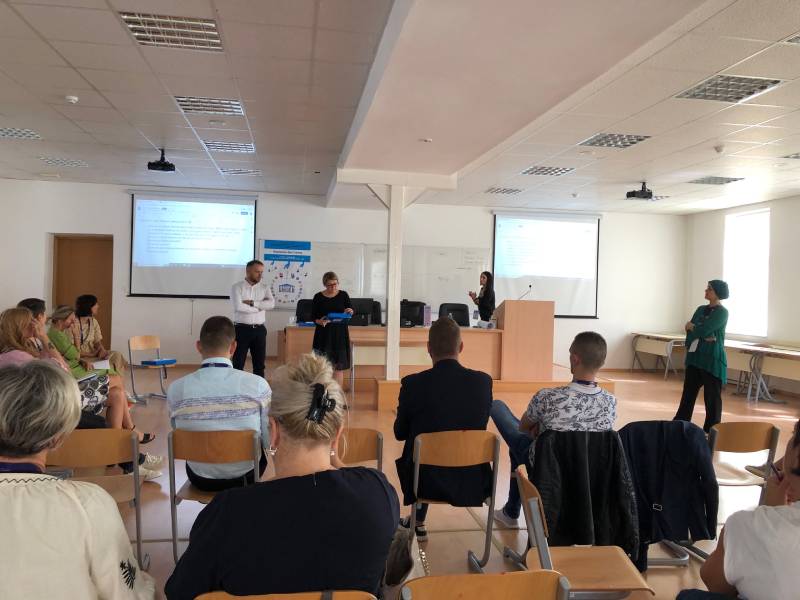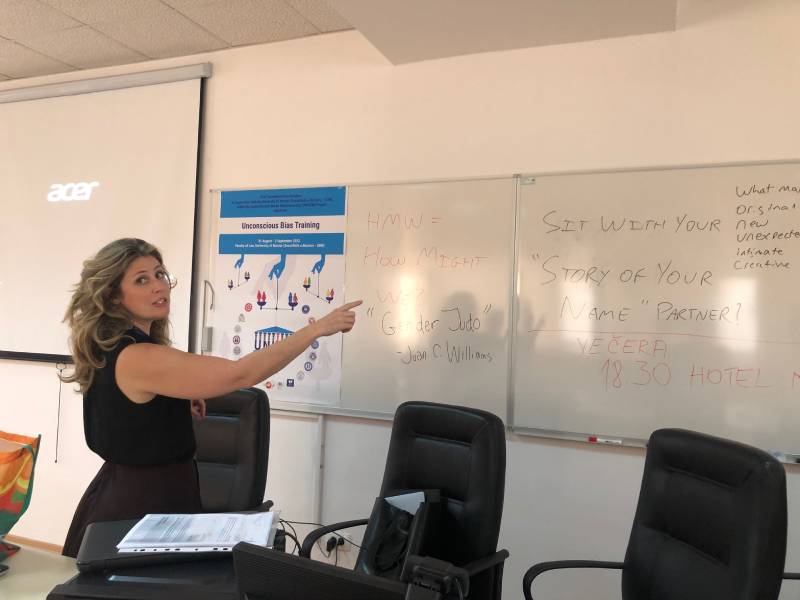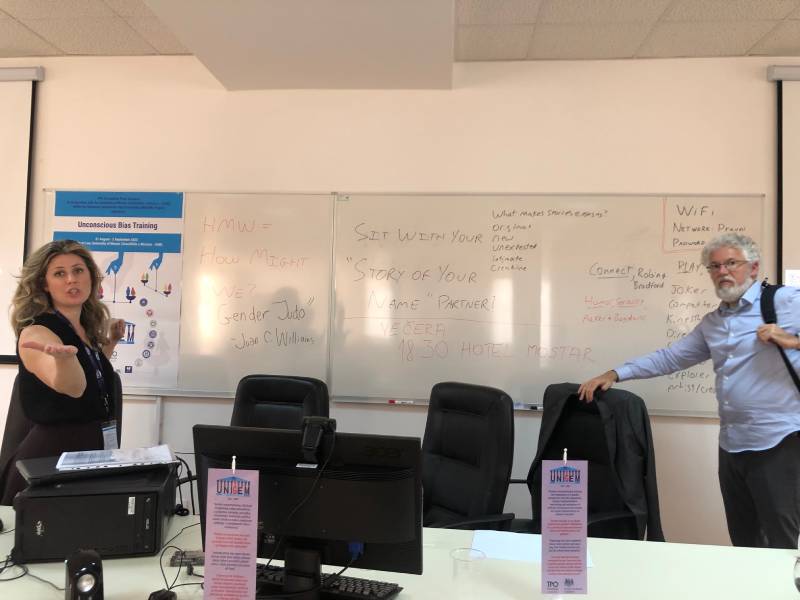TPO Foundation from Sarajevo in cooperation with the University of Mostar (Sveučilište u Mostaru – SUM) within the University and Gender Mainstreaming (UNIGEM) project, from 31st August till 2nd September 2022, held a training on unconscious bias at the Faculty of Law of the University of Mostar (SUM). During the three days of training, participants (university teaching and administrative staff from 19 partner institutions, had the opportunity to attend the lectures and to participate in practical exercises provided by professors Dr. Melissa Jones Briggs and Dr. Dan Milton Klein from Stanford University (USA).
In the course of the first day of the UNIGEM’s Training, the following topics were presented:
1. Generative Leadership
2. Strategies for Inclusive Cultures
3. Psychological Safety
4. Acting with Power
Regarding Generative Leadership, participants were asked to explore the unconscious and unseen nuances of power in workplace behaviour, with the goal to benefit from the ability to detect and address bias in themselves and others and navigate complex dynamics with greater ease. Combining expertise from the social sciences, the performing arts, and design thinking, our trainers, Prof. Melissa Jones Briggs and Prof. Dan Milton Klein, shared best practices for developing agile, innovative, imaginative, and inclusive leaders.
The session on Strategies for Inclusive Cultures was focused on the fundamentals of unconscious bias and strategies to mitigate bias for individuals and organisations.
During the session on Psychological Safety, participants explored and crowdsourced applicable strategies for establishing psychological safety in groups and teams and classrooms in specific contexts.
In the part on Acting with Power, the main question asked was „When, how and why do we “perform” power?“ In this session, participants explored their relationship to power and their ability to create impact. Supported by research from the fields of social science, they reviewed fundamentals of delivery and explored their default behavioural comfort zone and general human ambivalence and behaviour on the topic of Power. Also, under the trainers’ guidance, participants examined how verbal and nonverbal behavioural cues affect their ability to meaningfully influence people, teams and cultures.
On the second day of the Training, participants had the opportunity to acquaint themselves with the topics of:
Acting with Power II
Story Craft I – Improvisational Story Strategies
Story Craft II – Storycraft for Inclusion
Allyship and Action – Upstanding with Power
Acting with Power II – Recent emerging research in the fields of social psychology has illuminated the primacy of warmth. Performing this critical dimension of power with agility is a crucial determinant of trust. This session looked at the latest data, explored behavioural signals for authority, approachability, competence, character and caring through the lens of advancing inclusion. The session also explored peer-coaching strategies.
Story Craft I – Improvisational Story Strategies
Stories connect, uplift, enrol, enthral, engage, and inspire. There are a handful of simple and effective techniques for maximising the impact of a person’s stories – but it is the act of practicing those techniques in a supportive environment that offers real benefits: trust, psychological safety, community, alignment, connection across difference, a culture of feedback and a growth mindset.
Story Craft II – Storycraft for Inclusion
The opportunity to realise those benefits (trust, psychological safety, community, alignment, connection across difference, a culture of feedback and a growth mindset) lies in nurturing a culture of belonging. This session was partially informed by an intervention pioneered at Yale (and offered at Stanford and other universities) in which a single, dorm-based event, led to dramatic improvements in GPA and steep reduction in drop-out rates for underrepresented minority students. The application of similar interventions on leadership teams in organisations was explored.
Allyship and Action – Upstanding with Power
Responding to misuses of power, even unintentional ones, can be hard in the moment. Combating bias and increasing diversity at every level of an organisation requires active allyship. In this engaging interactive session participants explored their roles as upstanders and ways to avoid the bystander effect. The session explored ways to uncover acts of micro-sponsorship for allies and strategies to identify and diffuse microaggressions to make work and relationships better.
On the third day (the last one) of UNIGEM’s Training, participants under the guidance of Prof. Dr Zilka Spahić Šiljak and Prof. Dr Jasna Kovačević took the final activity of developing practical guidelines on application of knowledge gained during the Unconscious Bias Training to the individual institutions.
At the end, we wholeheartedly thank to all our project partners (University of Sarajevo, University of Banja Luka, University of Bihać, University of Zenica, University of Istočno Sarajevo, University of Tuzla, University of Mostar (Sveučilište u Mostaru), Džemal Bijedić University of Mostar, International Burch University, International University Travnik in Travnik, Sarajevo School of Science and Technology, University of Hercegovina, University of Donja Gorica, University of Montenegro, University of Belgrade, University of Novi Sad, University of Rijeka, University of Zagreb, and Josip Juraj Strossmayer University of Osijek) and to their respective representatives who came to Mostar and attended the training in person.
The University and Gender Mainstreaming (UNIGEM) stands for commitment of universities devoted to ensuring gender equality and a safe environment for teachers and students at universities in Bosnia and Herzegovina and the region, by introducing a gender perspective. The project is fully financed by the Government of the United Kingdom. The project partners are universities from Bosnia and Herzegovina, Croatia, Serbia and Montenegro.


























